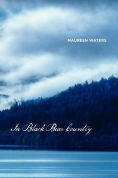Waters says in the Preface, “The bears, which appear in the title poem, are intended to suggest unpredictability, the mysterious and dangerous aspects of experience as well as the possibility of love.” The image and her explanation of it serve as a thematic summary of the poems in this collection.
In the title poem she says of the bears, “For all their size, they move silently, uprooting boundaries, nudging possibilities.” I like the way she challenges boundaries herself, immersing herself in Ireland, its myths and the place itself, the place her parents left for the U.S. Her description of the roofless house of gray Connemara stone, “the storied source”, and the ancestral memories it calls up is stunning in its controlled emotion. She says, “even the ghosts had vanished.”
Unpredictability is everywhere, whether it is a house fire, sudden storms, the aftermath of Katrina. Most of all it is apparent in the losses, the loss of herself, of her son. She says, “these children are not predictable.” And later: “On the lawn Brian is beginning to climb / the voluminous branch of a willow tree. / He cannot know / that it will snap / in the prodigious grip / of a tornado.”
This is a stunning way to approach great grief, obliquely, using a screen of imagery. The tree and tornado. And she speaks of him as having crossed a boundary. I think this use of imagery is one of the great benefits of using poetry to delve into memoir. Through a poem’s music and concise imagery, we bring the reader with us into the experience.
Another benefit is that these brief poems, most no more than a page, often capture a single glimpse of the past, a single moment we remember out of all the moments we’ve experienced. And this is how memory works sometimes: throwing up a scene seemingly at random. The poet then must make sense of it, as she does remembering a joyful moment of picking hyacinths with her sister. “Yet, this was earthquake country,” she says. Although “we sensed the trembling of the earth, / the sullen hiss of rising tide” they are carried away by their bliss, sure that such beauty would last forever.
I appreciate her poems of the Hudson River Valley. No delicately dancing daffodils, Waters gives us hawks and vultures, ruined gardens and floods. She believes the hemlock—“Seared by lightening [sic], wind and blight”—is the spirit of the place. Yet she finds hope in small things: “the precise point a rivulet wells up into / a pool . . . we cannot detect / the slightest movement. But something is / surely there.” I treasure that “surely”, the pause it creates, the certainty behind it.
There is love, too. Not just the love of children and rough nature, but an exploration of a thirty-year marriage to a man “known and yet unknown”.
These are poems to read again and again.
Is there a memory you have of some event, some moment so insignificant you don’t know why it has stuck with you?
